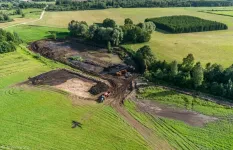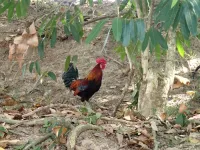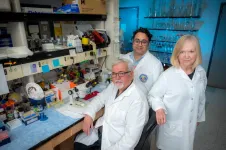(Press-News.org) Cattle-rearing is the biggest cause of tropical deforestation in the Amazon - and the world.
A study has found that some of the world’s largest slaughterhouses reduced cattle-driven deforestation in the Amazon by 15% - equivalent to sparing 7,000km2 of forest from clearance (4.5 times the size of London) - through their commitment to zero-deforestation policies between 2010 and 2018.
If these policies were fully implemented and adopted across all cattle companies operating in the Amazon, 24,000km2 of forest (an area larger than Wales) could have been spared over this time, effectively halving cattle-driven deforestation in Brazil.
Deforestation is the second largest contributor to global greenhouse gas emissions after fossil fuel use, and the Brazilian Amazon is the world’s deforestation hotspot.
Zero-deforestation commitments are supply chain policies aiming to ensure production of goods does not involve deforestation, by identifying and dropping suppliers who produce on areas recently cleared of natural vegetation. The commitments have been signed by many leading UK beef retailers, including the supermarkets Tesco, Sainsbury’s, and Waitrose.
Although the UK imported 60 million tonnes of Brazilian beef in 2017, according to the National Beef Association the UK is 75% self-sufficient for beef. Many British companies are increasingly turning away from Brazilian beef due to the perceived risk of deforestation. But the researchers argue that this is not the best approach.
“We can benefit the climate by eating less meat in general. But when it comes to deforestation, the solution is not to avoid beef from specific countries – because then we lose our power to make a difference in those places,” said Professor Rachael Garrett, Moran Professor of Conservation and Development at the University of Cambridge Conservation Research Institute, senior author of the report.
She added: “If we do eat imported beef, we should buy it from retailers that are trying to improve cattle production systems in Brazil and elsewhere. If enough countries join the UK and EU in purchasing only deforestation-free beef it’s likely to have a positive impact on the planet by reducing deforestation.”
The results are published today in the journal Global Environmental Change.
Due to the complexity of Brazilian supply chains and incomplete availability of public records, it has been challenging until now to determine how much of the cattle in any given region was being purchased by companies with zero-deforestation commitments. This impeded efforts to analyse the effectiveness of zero-deforestation policies linked to beef and leather goods - such as shoes and handbags.
The researchers traced the links between farming regions, slaughterhouses and companies with zero-deforestation commitments in the Brazilian Amazon cattle sector, to see how these links influenced deforestation.
An agreement called G4 is the most widespread and strongly implemented zero-deforestation commitment for cattle in the Brazilian Amazon – accounting for over 99% of cattle exports. The study focused on companies that have adopted the G4 Agreement, and found they were associated with substantial reductions in deforestation.
“We’ve shown that zero-deforestation policies are having an important - and measurable – impact in protecting forests, and that with widespread adoption and rigorous implementation they could achieve a lot more,” said Garrett.
She added: “Even reducing deforestation by 15% is a huge amount. But this result shows that supply chain policies have significant limitations, and we need to couple them with more visionary approaches to help countries like Brazil improve their agricultural systems.”
The researchers say a mix of interventions by the private and public sector is needed to improve cattle-rearing practices and help eliminate deforestation in countries like Brazil.
Public sector interventions could include support for alternative economic activities, and financial incentives or greater pressure to avoid deforestation from the Brazilian government.
“With this evidence, supermarkets can use their influence to help improve Brazilian cattle production. But more needs to be done to improve the rigour of corporate policies and the market coverage of policy adopters, even in relatively well-covered regions such as the Brazilian Amazon,” said Dr Sam Levy at ETH Zurich and New York University, lead author of the report.
Cattle production for beef and leather is the cause of over 70% of all deforestation in the Amazon – much of which is illegal. Zero-deforestation commitments cover 82% of beef exported from the Brazilian Amazon for trade internationally – but a large amount of beef production destined for Brazil’s domestic markets is not covered.
Deforestation causes the loss of diverse animal and plant life, threatens the livelihoods of indigenous groups, and increases inequality and conflict.
In 2021, the COP26 Glasgow Leaders’ Declaration on Forests and Land Use committed to halt and reverse deforestation by 2030. It was signed by over 100 countries, representing 85% of global forests.
END
Companies’ zero-deforestation commitments have potential to halve cattle-driven deforestation in Brazilian Amazon
2023-04-20
ELSE PRESS RELEASES FROM THIS DATE:
Exposure to air pollution during pregnancy increases risk for flu
2023-04-20
During pregnancy, women are more susceptible to severe respiratory infections from multiple viruses, including influenza A virus (IAV), respiratory syncytial virus (RSV) and severe acute respiratory syndrome coronavirus (SARS-CoV-2). Additionally, pregnant women are disproportionately affected by influenza, resulting in a more than 10-fold increase in hospitalization risk.
A new study led by Dr. Natalie Johnson, associate professor in the Texas A&M University School of Public Health’s Department of Environmental and Occupational Health, shows that exposure to ultrafine particles (UFPs) during pregnancy enhances respiratory ...
Trim the sugar: New HIV vaccine design improves immune response
2023-04-20
LA JOLLA, CA— A new HIV vaccine from Scripps Research has shown a significantly improved ability to neutralize the virus in preclinical tests, and it will soon be studied in healthy people who volunteer to participate in clinical trials.
The new and unique vaccine design, described in a paper in Nature Communications on April 9, 2023, uses tiny protein “nanoparticles” to display multiple copies of HIV’s surface protein Env, thus presenting itself to the immune system much as real HIV particles would ...
Immediate carbon cuts, common marine heatwave terminology urged
2023-04-20
Over the past two hundred years, the ocean and atmosphere have been accumulating massive amounts of carbon dioxide as factories, automobiles, airplanes, and more churn out the powerful greenhouse gas. Two articles published recently in Nature by University of Hawai‘i at Mānoa oceanographers provide a reality check on the limitations of carbon dioxide removal and a warning that marine heatwaves need clear definitions so communities can adapt.
Carbon dioxide removal is not the golden ticket
In all the scenarios assessed by the Intergovernmental Panel on Climate Change, nations around the world must dramatically and rapidly reduce their dependence ...
Paul Hessburg receives Distinguished Landscape Ecologist Award
2023-04-20
Paul Hessburg received the International Association for Landscape Ecology-North America Chapter’s 2023 Distinguished Landscape Ecologist Award. The annual award recognizes major scientific contributions to landscape ecology, honors scientists who have played a pivotal role in shaping the field, and is the organization’s highest honor.
Hessburg is a senior research ecologist with the USDA Forest Service's Pacific Northwest Research Station based at the Wenatchee Forestry Sciences Laboratory. He was honored for a highly diverse career that has "greatly enhanced the capacity of landscape practitioners to develop strategies and ...
Cut council tax for green gardeners to help cities tackle climate change
2023-04-20
Homeowners should be rewarded to garden sustainably, new research by Professor of Environmental Horticulture at University of Sheffield, recommends
Rewards for sustainable gardening could include reductions to council tax, water bills or assistance with resources
Ensuring urban gardeners have the ability to have planted gardens will have numerous benefits for the environment and communities
Banning environmentally damaging materials, such as pesticides; or practices such as installing astroturf, could also benefit the environment
Research shows that some cities may have lost as much as 50 per cent of their green garden space over the last ...
Online tool found to be effective at assessing dementia risk
2023-04-20
Researchers at UNSW Sydney and Neuroscience Research Australia (NeuRA) have developed and evaluated a tool for assessing dementia risk, with promising initial results.
Currently, over 55 million people are living with dementia around the world, with that number set to increase to 78 million by 2030, and the focus on dementia research increasingly shifting towards prevention.
The online tool takes approximately 20 minutes to complete and provides a personalised dementia risk report that patients can discuss with their doctor.
Since developing the risk tool – known as CogDRisk – in 2022, the team has been evaluating the success of the tool, by trialling it on four existing datasets, ...
A myth no more: Cranberry products can prevent urinary tract infections for women
2023-04-20
Drinking cranberry juice has long been a mythical prevention strategy for women who develop a urinary tract infection – and new medical evidence shows consuming cranberry products is an effective way to prevent a UTI before it gets started.
A global study looking at the benefits of cranberry products published in Cochrane Reviews has determined cranberry juice, and its supplements, reduce the risk of repeat symptomatic UTIs in women by more than a quarter, in children by more than half, and in people susceptible to UTI following medical interventions by about ...
Recycling lake sediments for crop production: A sustainable solution for closing the phosphorus cycle
2023-04-20
A four-year field experiment conducted on the shores of restored Lake Mustijärv in Viljandi, Estonia, has revealed that recycling phosphorus-rich lake sediments back to agriculture could have positive impacts on crop production.
The study was conducted by doctoral researcher Mina Kiani and the AgriChar research group, and it is globally the first of its kind to cover the environmental aspects of recycling lake sediments to agriculture over several years. Kiani defends her thesis on 21 April at the University of Helsinki Faculty of Agriculture and Forestry.
The study aimed to find a sustainable solution for closing the leaking agricultural phosphorus (P) cycle by recycling P-rich ...
Chicken breeding in Japan dates back to fourth century BCE
2023-04-20
Conclusive evidence of chicken breeding in the Yayoi period of Japan has been discovered from the Karako-Kagi site.
The chicken is one of the most common domesticated animals, with a current estimated population of over 33 billion individuals. They are reared for their meat and eggs, and may be kept as pets.
The chicken is believed to have been domesticated in Southeast Asia about 3500 years ago, following which they were carried to all corners of the world. The exact date of introduction of chicken breeding to Japan is under debate, as there are no historical records and archeological evidence ...
Protecting the vision of premature babies
2023-04-20
AUGUSTA, Ga. (April 20, 2023) – In the spiraling cycle that can lead to vision loss in premature newborns, Medical College of Georgia scientists have found a new target and drug that together appear to stop the destruction in its tracks.
In babies, the development of the blood vessels of the retina should be complete by birth. But with preterm birth, the still-immature retina can develop a potentially blinding eye disorder known as retinopathy of prematurity.
When premature babies transition from inside the womb, where ...




